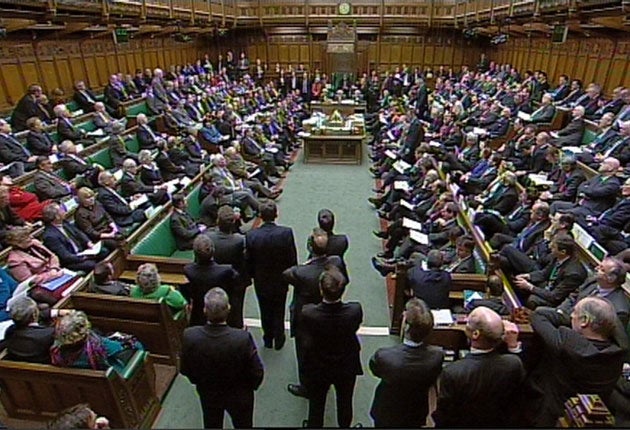Tory and Labour rebels unite against AV vote
The alternative vote referendum has been linked to changes that could halve Lib Dem parliamentary seats

Your support helps us to tell the story
From reproductive rights to climate change to Big Tech, The Independent is on the ground when the story is developing. Whether it's investigating the financials of Elon Musk's pro-Trump PAC or producing our latest documentary, 'The A Word', which shines a light on the American women fighting for reproductive rights, we know how important it is to parse out the facts from the messaging.
At such a critical moment in US history, we need reporters on the ground. Your donation allows us to keep sending journalists to speak to both sides of the story.
The Independent is trusted by Americans across the entire political spectrum. And unlike many other quality news outlets, we choose not to lock Americans out of our reporting and analysis with paywalls. We believe quality journalism should be available to everyone, paid for by those who can afford it.
Your support makes all the difference.Liberal Democrats would lose half of their seats under plans for a smaller House of Commons, the Labour Party claimed last night, as the battle over electoral reform threatens to spark the coalition's first major rebellion.
Tomorrow, Tory backbenchers are expected to join with senior Labour figures in an attempt to derail the passage of legislation on cutting the number of MPs from 650 to 600 and the staging of a referendum on adopting the alternative vote on 5 May 2011.
Labour claims the planned reduction in MPs is a gerrymandering tactic by the Tories, while there are few enthusiasts for the adoption of AV on the government side. Normally loyal Tories are expected to vote against the legislation, pointing out that neither party in the coalition promised AV in their election manifestos. Under AV, voters rank candidates in order of preference. Leaders of the revolt suggest opposition to the AV proposal is "widespread", and that during the summer recess away from Westminster – and the whips – the mood of rebellion has hardened.
Gary Streeter, a Conservative minister in John Major's government, warned: "There is a lot of concern about the implications for the Conservative Party, about [whether] we would ever have an outright Conservative government again. If that is the case, we have to ask ourselves, why would we ever vote for this?"
And Daniel Kawczynski, Tory chairman of the All Party Group for the Promotion of First Past the Post, suggested that up to 70 Labour and Tory MPs could together block the move, which he dismissed as "just something the liberal elite wants". However, the coalition believes that with Sinn Fein MPs absent from Westminster, it has a working majority of 83.
Research released by the Labour Party suggests that the redrawing of constituency boundaries to reduce the number of MPs could lead to the Liberal Democrats suffering disproportionately more than any other party, with the heavy swing against them magnifying the losses. Since entering the coalition, the Lib Dem vote share has plummeted to 12 per cent, which Labour strategists hope to exploit.
Jack Straw, Labour's justice spokesman, will argue that the AV referendum – which Labour backed in its manifesto – should not be combined with the "entirely unrelated provisions designed to gerrymander constituencies by imposing a top-down, hasty and undemocratic review of boundaries, the effect of which would be to exclude millions of eligible but unregistered voters from the calculation of the electoral average".
A major drive to update town hall voting lists is now under way, after concerns were raised that the new boundaries would be drawn up based on out-of-date electoral numbers.
Last night, Mr Straw said Labour's analysis "should serve as a timely warning to Lib Dem MPs". "The party has fallen into a Tory trap and combined the legislation for a referendum on AV with a partisan Tory boundary review, which could more than halve Lib Dem parliamentary representation and push the party back to the Scottish Highlands and the south-west of England. To coin an old phrase, the Lib Dems look like turkeys voting for Christmas."
The Deputy Prime Minister, Nick Clegg, is understood to have been assured by senior Tories that an attempt by Tory rebels to shift the referendum date from 5 May will be blocked. It had been claimed that to hold the vote on the same day as elections to the Scottish Parliament, Welsh and Northern Ireland assemblies would skew the result. Bernard Jenkin, a leading Tory rebel, said staging the polls together amounted to a "fiddle".
Half of the Lib Dem membership believe that one of the biggest threats their party faces is losing the referendum vote next year, according to a poll by the website Lib Dem Voice. However, Mr Clegg has insisted that securing the change to AV is not make or break for the coalition. "If [the electorate] say no, they have said no," he said. The Yes and No campaigns will each be limited to spending £5m.
Join our commenting forum
Join thought-provoking conversations, follow other Independent readers and see their replies
Comments